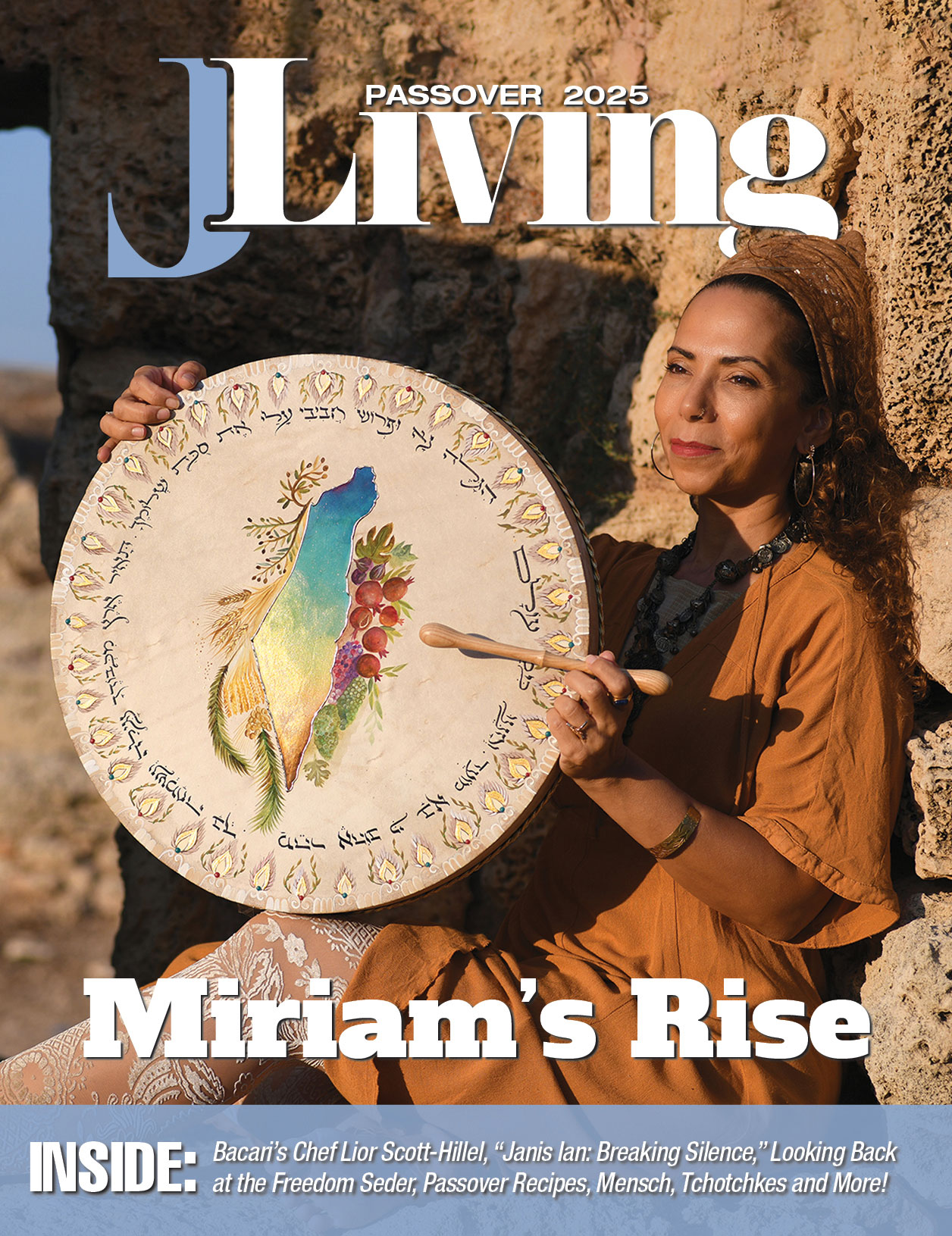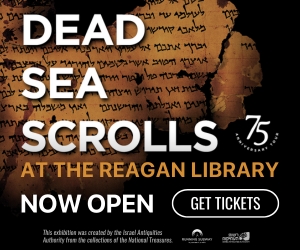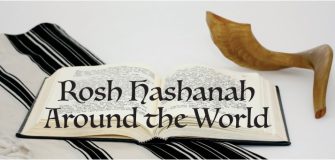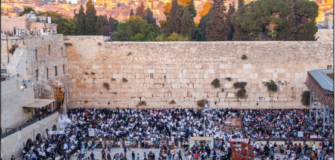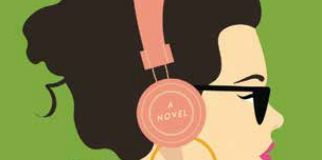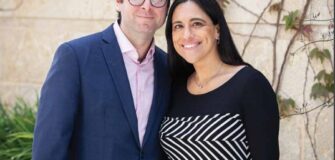Mensch – Jeremy and Ilana Hamburgh

Southern California-based Jeremy and Ilana Hamburgh are dedicated to helping neurodiverse adults develop the skills to find friendship, community, and love.
Jeremy Hamburgh, founder of My Best Social Life, has been coaching autistic and neurodivergent adults since 2010. Ilana Hamburg, the Director of Education, joined last year, after being a special education teacher in the New York City public school system for 16 years.
The couple, who met at a wedding back east in 2020, started dating long-distance during COVID. They got married on Memorial Day.
The mission of My Best Social Life is to help wonderful people with different brain wiring find the community and connection they want and deserve.
Jeremy, What led you to create My Best Social Life?
Jeremy: When I lived in New York, I co-founded a 20s/30s organization at B’nai Jeshurun synagogue in New York City; our Shabbat dinners would easily have 150 young professionals. Most of them were there because they were single and wanted to find someone Jewish, and I watched a lot of them swing and miss. At one point, two friends I had made through the group asked me to coach them, and that led me to three years of reading about the science of what makes two people attract.
What I discovered in all of these science books neatly lined up with what I was learning as a young New York City prosecutor: That projecting confidence, asking good questions, telling good stories, and being a good listener are four of the most important things you can do to be magnetic. So, now when people tell me what a drastic change it is to go from being a lawyer to an autism and neurodivergent friendship and dating coach, I just tell them that there isn’t much difference between winning over a jury of 12 in a courtroom and a jury of 1 in a social setting.
Around 2010, I started doing innovative dating workshops for the JCC in Manhattan, and they were so popular that I was invited back again and again. What I didn’t realize was that many of the people coming to my workshops were autistic and neurodivergent, and that’s because I also didn’t realize that the JCC had three special needs organizations operating under its roof. Pretty soon, they started asking me to do workshops directly for their members. With the help of its director Allison Kleinman, I ended up staying with the Adaptations Program at the Silver Center for Special Needs for more than three years.
I learned a ton from the Adaptations attendees; probably more than they learned from me at the time. And I used that knowledge to launch MyBestSocialLife.com.
Ilana, What led you to work with My Best Social Life?
When I started dating Jeremy, all he talked about was his clients and new ways to help them be socially successful. He asked me if I wanted to join one of his program’s Weekly Community Calls. Basically, all the clients in the program (and many of their parents) join a Wednesday evening Zoom call where they share their victories, ask questions, and get coaching. I’ve never seen a more inspiring group of young adults.
Leaving New York City was a tough decision. I spent 16 years as a special education teacher in the New York City public school system. But I was excited to start my new life with Jeremy, and he asked me to be My Best Social Life’s Director of Education, and we came to an agreement: I’d be the Director of Education for one year, and if I didn’t like it, I’d go back to the classroom.
Let’s just say that I don’t see myself going back to the classroom!
Who do you serve? How do you help/what is the process?
Jeremy: Our clients are autistic or neurodivergent adults who are lonely and want to find community, friendships, and maybe even romantic partners. Our youngest clients are around 18. Our oldest are in their 60s. But the vast majority of our clients are in their 20s and 30s.
I looked at all the social skills coaching that was happening in the autism world, and it wasn’t really moving the needle for people, at least not on a very big scale. I wanted to innovate in a meaningful way, and over time, that became Social Life 360.
Here are a few things about the program that are really innovative:
First, we give our clients a vibrant online community from the minute they join the program. We have a worldwide chat group of our clients and graduates, which is active pretty much all day. We also have smaller regional chat groups so that our clients can share ideas and make plans to get together with each other. And there’s also a chat group for the parents because it’s nice to know that there are others who have been on a similar journey as you.
Second, we teach our clients the A to Z of building community, making friends, and starting to date, and we teach a little bit of strategy and skill every day, so that what they’re learning builds upon itself slowly but steadily.
Third, we teach the skills and strategies through a combination of training modules, group training, individual coaching, and wraparound support. So, the lessons they’re learning are reinforced over and over again.
Finally, most importantly, we’re teaching the skills and strategies in a way that’s easier for their brains to digest. The autistic and neurodivergent brain tends to love patterns, formulas, and processes, so we decode the social world for our clients and we recode it for them in a way that makes it easier for them to understand the world around them, and then be a participant in it.

How has philanthropy enriched your life?
Jeremy: Ilana and I both have parents who are very active in their Jewish community, and who do a lot of charitable work within it. They’re really been role models for us, and we’ve started to become much more active in the Beth Jacob community, here in Irvine California. But we have some pretty big plans, and philanthropy is involved…
Inspired by our good friends Aleeza Ben Shalom (star of Netflix’s Jewish Matchmaking) and “The Love Rabbi” Yisroel Bernath, we are spinning off our flagship Social Life 360 program for the more religious Jewish community. The working title for the to-be launched program is From Schmoozing to Shidduch (JewishSocialCoaching. com), because life is better when you’re able to be part of the fabric of a community and find love, too.
The program will have a tuition but here’s where the philanthropic part comes in…
We are going to be creating a non-profit to spread our message that autism and neurodivergence doesn’t need to mean loneliness, and also to offer scholarships for autistic and neurodivergent adults who want to be a part of our program but otherwise couldn’t afford to. We don’t know very much about fundraising yet but we’re absolutely dedicated to expanding the impact we have on people with autism and neurodivergence, with a big focus on the Jewish world. We know that traveling around the country and the world teaching communities best practices for connecting with autistic and neurodivergent adults and teaching autistic and neurodivergent adults best practices for being more social is going to have huge impacts on people’s lives.
Separate from that, Rabbi Bernath, Aleeza, Ilana and I formed an organization called the International Matchmaking University (“IMU” for short) whose goals are to bring the matchmaking community closer together and train them on best practices so that they can be as impactful as possible. So far, IMU has led really inspiring trainings in Montreal and Jerusalem, and we look forward to bringing it to the United States and elsewhere.
When was the first time you participated in Tzedakah? Can you share your first significant donation, whether it was by donating your time or financially?
Jeremy: My mom’s parents always had a pushka in their home, and that’s something that always stuck with me. I also went to Kinneret Hebrew Day School where giving tzedakah was a big part of our education. So, I can’t remember the first time that I gave tzedakah, and it’s something that I focus on with my kids, so I doubt they’ll be able to remember their first time giving tzedakah, either!
One of the most significant donations I ever made was to my synagogue, B’nai Jeshurun. The shul wanted to repurchase the community house that it was forced to sell off years earlier. I was a very big believer in what BJ was doing, and I was very active on its committees, so I donated an entire paycheck to the effort to buy the community house. Mind you, I wasn’t making very much back then; my salary as a young prosecutor wasn’t much more than $50,000 at the time. But giving an entire paycheck to an organization that meant so much to me was a truly wonderful feeling.
What are simple ways anyone can give back/participate in Tikun Olam?
Jeremy: Our rabbi, Yisroel Ciner of Beth Jacob in Irvine, was kind enough to let me give a d’var for Parashat Yitro. What I said at our shul is what Ilana and I tell everyone who listens: People with autism and neurodivergent brains are some of the smartest, kindest, most loyal, most honest, and most wonderful human beings on the planet, and they have so much light and love to give this world, but their brain wiring can make it hard for them to socialize, so they often find themselves feeling like outsiders.
One of the biggest acts of tikun olam that you can do is to help even one autistic or neurodivergent person in your community feel like he or she belongs. Whether that’s asking them to sit next to you at shul or inviting them for Shabbat Dinner or even just asking them how they’re doing, helping an autistic or neurodivergent person feel like they’re a valued part of the community can absolutely change their life (and yours).
Who inspires you?
Ilana:The easy answer is that our families inspire us. And they do! We both have amazing parents who rose to the top of their professions – one lawyer, one doctor, one physical therapist, and one occupational therapist – and did it with kindness and compassion. We also have amazing siblings who have followed in our parents’ footsteps.
But you don’t want us to take the easy way out so I’ll say that the two people who inspire us day in and day out are Rabbi Bernath and Aleeza. When we’re together, we literally stay up all night; we’re just an idea factory when we’re together, and every one of those ideas is aimed at making the Jewish world and the broader world a better place.
What is your favorite Jewish meal?
Jeremy: Chicken soup with matzo balls, crispy chicken, and tzimmes. It reminds me of my grandmothers and all the meals we shared together. My mom makes a pretty darn good version of the crispy chicken and Ilana makes a delicious matzo ball soup, so I’m pretty lucky!
Ilana: Matzo ball soup and pastrami on a roll.
Anything you want to add?
Ilana and I are always looking for new ways to impact the social lives of autistic and neurodivergent adults. If there’s a person or an organization for whom this is a passion, we want to meet them! Email us at Jeremy@MyBestSocialLife.com.

